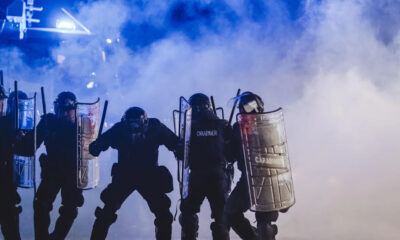World
Hamas’s Ideological Roots Exposed in Wake of October 7 Attack

The events of October 7, 2023, revealed a stark reality regarding Hamas’s intentions towards Israel, contradicting previous assumptions about the group’s motivations. On that day, approximately 4,000 Hamas militants, alongside around 2,000 other individuals from Gaza, breached the Gaza-Israel border. Their assault resulted in the deaths of about 1,200 people, primarily civilians, and the kidnapping of approximately 250 others.
In the aftermath of the attack, Hamas attempted to distance itself from the violence inflicted upon civilians. They claimed that their fighters were “keen to avoid harming civilians,” although they conceded that “maybe some faults happened.” However, evidence suggests that the operation was designed to inflict maximum harm. Notably, a notebook found on a deceased Hamas fighter contained orders to “kill as many people and take as many hostages as possible.”
The images and videos disseminated by Hamas on social media that day displayed extreme brutality, illustrating a profound hatred toward Israel. A recording of one militant calling home to boast about his actions further exemplified this mindset. “I killed her and her husband, I killed 10 with my own hands,” he stated, signaling an intention of violence that transcended mere political grievances.
Operation Al Aqsa Flood: Objectives and Implications
Hamas labeled the October 7 assault as Operation Al Aqsa Flood, with military leader Mohammed Deif articulating their grievances against Israel in an audio statement. He condemned Israel’s policies and actions in the West Bank and Gaza but clarified that the assault was not aimed at changing Israeli policies. Instead, he proclaimed a revolutionary intent, stating, “Today is the day of the great revolution that will end the last occupation and the last racist apartheid regime in the world.” Deif’s rhetoric called for a united Palestinian uprising and an appeal to regional allies, including Iran and Hezbollah.
Reports indicate that the attack was not merely a singular event but a prelude to a broader regional confrontation aimed at the complete destruction of Israel. Planning for the operation had been ongoing for years, primarily involving a small circle of Hamas leaders in Gaza. The leadership was aware of the potential for massive Israeli retaliation but chose to proceed nonetheless, emphasizing their commitment to violent resistance over any semblance of governance.
While some Hamas officials later expressed regret over the scale of violence, public statements from the group uniformly praised the attack. Ismail Haniyeh, the head of Hamas’s political office, stated, “Our objective is clear: we want to liberate our land, our holy sites.” His message was unequivocal: “Get out of our land. Get out of our sight.” This sentiment was echoed by other leaders, including Khaled Meshaal, who asserted that the events of October 7 had paved the way for the elimination of Israel.
International Reactions and Miscalculations
The implications of the attack have reverberated beyond the immediate region, prompting discussions on the perceptions of Hamas within the international community. Many analysts had previously viewed Hamas as a group that was evolving towards moderation, particularly following its electoral participation in 2006 and governance in Gaza. Some scholars posited that the responsibilities of governance would lead to a more pragmatic Hamas.
This perspective shifted dramatically after October 7. The belief that Hamas had been deterred or transformed into a less aggressive entity was shattered. The strategic miscalculations extend to Israel, where officials, including national security adviser Tzachi Hanegbi, believed Hamas was adhering to a policy of restraint. They failed to anticipate the scale of the attack, thinking that Hamas would refrain from actions that could provoke severe Israeli retaliation.
Moreover, the academic community had similarly underestimated Hamas’s resolve. Predictions of a more moderate approach, such as those articulated in analyses like “Hamas 2.0,” suggested a shift away from violent rhetoric. Yet, the events of October 7 illustrated that the core ideology of Hamas remains rooted in rejectionism and hostility towards Israel.
As the situation unfolds, the stark reality of Hamas’s ideological commitment becomes increasingly evident. The group’s actions on October 7 were not simply tactical assaults but a reflection of a deep-seated belief in the necessity of violent resistance against what they perceive as an existential threat. The choice made by Hamas between governance and armed struggle underscores an unwavering commitment to its ideological goals, dispelling any notions of moderation.
The ramifications of this attack extend far beyond the immediate violence, posing significant challenges for regional stability and international relations. The world watches closely as the conflict escalates, with the potential for broader implications in the Middle East and beyond.
-

 World3 months ago
World3 months agoScientists Unearth Ancient Antarctic Ice to Unlock Climate Secrets
-

 Entertainment3 months ago
Entertainment3 months agoTrump and McCormick to Announce $70 Billion Energy Investments
-

 Science3 months ago
Science3 months agoFour Astronauts Return to Earth After International Space Station Mission
-

 Lifestyle3 months ago
Lifestyle3 months agoTransLink Launches Food Truck Program to Boost Revenue in Vancouver
-

 Technology2 months ago
Technology2 months agoApple Notes Enhances Functionality with Markdown Support in macOS 26
-

 Top Stories1 week ago
Top Stories1 week agoUrgent Update: Fatal Crash on Highway 99 Claims Life of Pitt Meadows Man
-

 Sports3 months ago
Sports3 months agoSearch Underway for Missing Hunter Amid Hokkaido Bear Emergency
-

 Politics2 months ago
Politics2 months agoUkrainian Tennis Star Elina Svitolina Faces Death Threats Online
-

 Technology3 months ago
Technology3 months agoFrosthaven Launches Early Access on July 31, 2025
-

 Politics3 months ago
Politics3 months agoCarney Engages First Nations Leaders at Development Law Summit
-

 Entertainment3 months ago
Entertainment3 months agoCalgary Theatre Troupe Revives Magic at Winnipeg Fringe Festival
-

 Politics1 week ago
Politics1 week agoShutdown Reflects Democratic Struggles Amid Economic Concerns




















